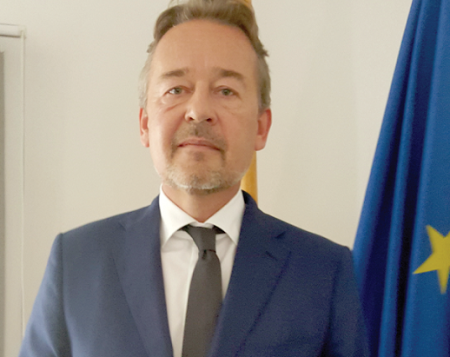by KATE BAABA HUDSON
Ghana is the third largest trade partner for Germany, which is an active global partner. The German Ambassador Designate to Ghana, Mr Christoph Retzlaff, who disclosed this, said development cooperation was one of the most important areas of German-Ghana relations.
The Ambassador was speaking in an exclusive interview with the Daily Graphic prior to the celebration of the German Unity Day, which falls today. The day is being celebrated on the theme: "Building Bridges".
The Ambassador said the relations between the two countries were strong in various areas.
He said total bilateral development commitments through the Federal Ministry for Economic Cooperation and Development from 2012 to 2014 stood at 160 million Euros.
The Ambassador gave the figure for trade volume for 2015 as 500 million Euros for both imports and exports. He said all efforts of development were informed by the United Nations’ Millenium Development Goals (MDGs).
Mr Retzlaff said the Ghana Shared Growth and Development Agenda served as key guidelines for German development cooperation.
Areas of cooperation
In the light of Ghana’s challenges and potential as a lower middle-income country, issues of good governance and economic development for equitable growth, he noted, were at the forefront of the country’s relations.
The key areas of German Development Cooperation were sustainable economic development, decentralisation, agriculture and budget support.
The promotion of renewable energies was increasingly important, he noted, adding that his country’s bilateral programme was complemented by many West African regional programmes operating in Ghana in such fields as peace and security, agriculture, climate change and HIV/AIDS.
In addition, he said many German Foundations and non-governmental organisations (NGOs) were active in Ghana; saying that Germany directly supported a number of Ghanaian NGOs.
German Development Cooperation offered a wide variety of flexibly applied instruments, such as financing, capacity building and advice, investments and public-private partnerships. (PPPs), he pointed out.
He said another area of engagement in the last couple of years encompassed the development of markets, products and services in close cooperation with business associations, ministries and district administrations.
Access to financial services for all, particularly for micro, small-scale medium-sized enterprises, was the other priority.
He said that included the establishment of new institutions, refinancing of rural banks and public awareness schemes of the basics of savings, loans and insurance.
Agriculture
The Ambassador was happy to note that agriculture played a key role in Ghana’s economy and in the livelihoods of half of her population, saying that Germany had an initiative, known as the Market Oriented Agricultural Programme (GMOAP), which aimed at improving the income of the rural population, particularly women, through a value-chain approach.
Through specific funds co-financed by other development partners, he said Germany provided innovative medium to long-term agricultural finance possibilities, using market mechanisms in cooperation with the local banking sector.
He noted that his country also cooperated closely with public and private service providers and focuses on capacity building at various levels and contributed to institutional and policy development.
He emphasised that Germany had four regional agricultural projects namely cashew, cocoa, cotton and rice, funded by the Bill and Melinda Gates Foundation.
State budget
The Ambassador designate said Germany contributed directly to the state budget of the government of Ghana, alongside eight other donors.
That, he said, sought to provide additional and predictable budget resources to enable Ghana to implement its National Development Strategy (Ghana Shared Growth and Development Agenda - GSGDA).
He noted that his country’s contribution to Ghana’s budget was closely linked to its support of good governance, adding that crucial partners to support the reforms on the public financial management systems were the Ministry of Finance, the Ghana Revenue Authority (GRA), the Ghana Audit Service, the Public Accounts Committee and stakeholders of the Extractive Industries Transparency Initiative.
To read the full piece from Graphic Online, click here.

